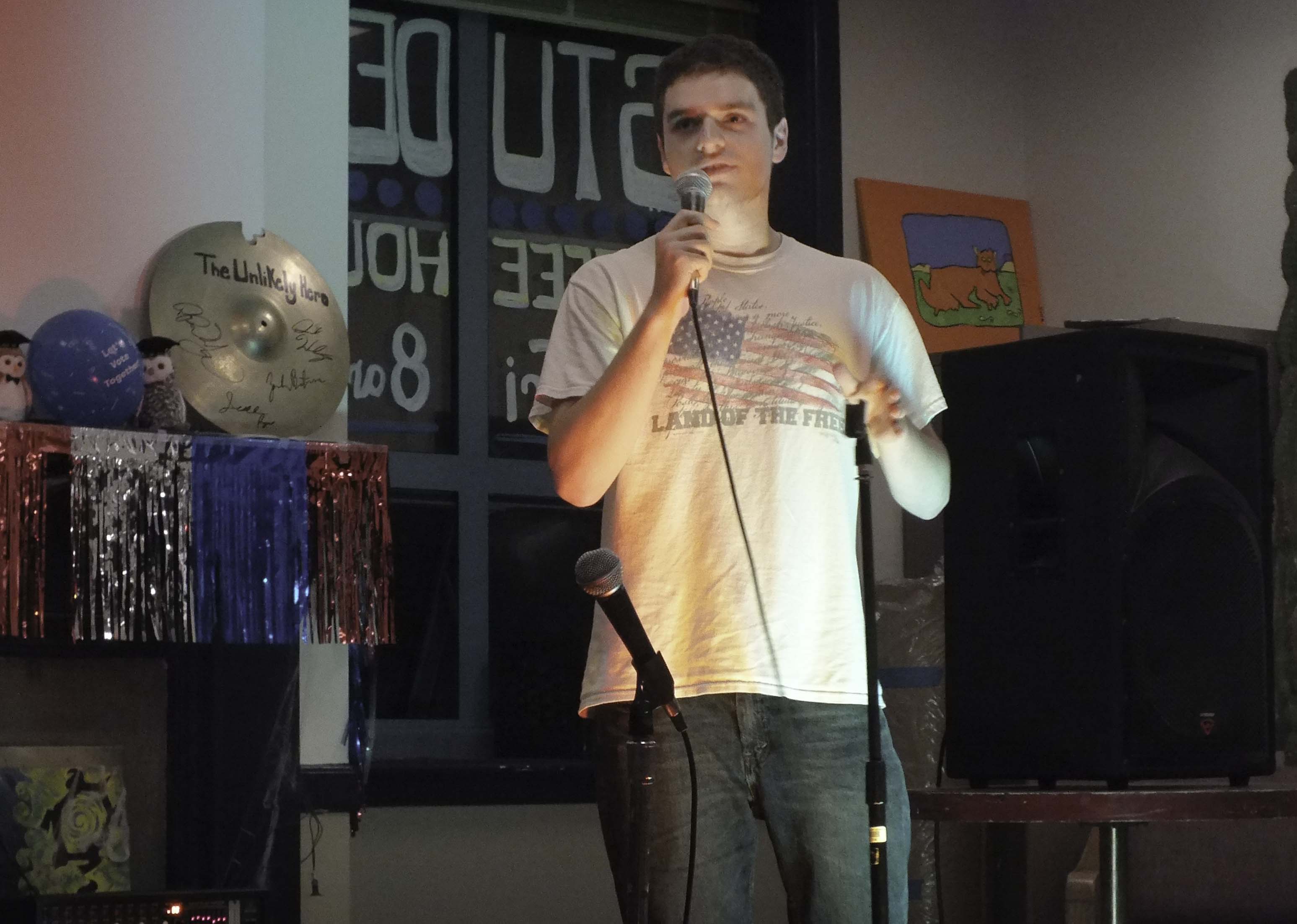Photo by Sarah Vinci |Jay Rumas (above) partnered with ACLU and Student Senate to host an event, encouraging students to vote for the 2018 elections.
Jay Rumas, a sophomore at the University of Rhode Island, paired with the URI American Civil Liberties Union and the Student Senate Cultural Committee threw a party last Thursday to energize students to vote.
The party was paid for by Rumas who was the recipient of a $1,000 grant from a nonprofit called #VoteTogether and MTV.
The voting party was held at 7 p.m. in the 193 Coffeehouse. The 193 Coffeehouse was decorated with red, white and blue ribbons while guests were given free necklaces and pins. Members from the URI ACLU and Student Senate were there to help in case anyone needed assistance registering to vote.
Dinner and dessert was served by Gregg’s restaurant, causing the line for food to be out the door. The party also had an open mic where singers, comedy groups and poets all got up to perform. In between sets, people would come up and reinforce the importance of voting into the audience’s mind.
MTV and #VoteTogether teamed up to provide grants to one person or organization in every state for the purpose of hosting a nonpartisan “election party,” or an event that encourages people to go out and vote. After applying online, Rumas won for the state of Rhode Island due to his passion for voting and democracy as a whole.
“Voting is such an important issue because it gives citizens a chance to select policy, or policymakers, that will govern and affect their country for years to come,” Rumas said. “Young people especially have a lot at stake in this election.”
Among some of the issues that surround youth, Rumas mentioned the student debt crisis and environmental disasters. Other issues that were mentioned were social security, Medicare and foreign affairs.
According to Child Trends, a nonpartisan research center, only 16 percent of youth voted in the 2014 midterm elections, and from 1972 to 2016, the proportion of youth ages 18 to 24 who reported voting in presidential elections decreased from 50 to 39 percent. “The fact that so many young Americans are apathetic to the state of politics is tragic, and needs to change immediately if we are to have a voice in these issues that directly affect our lives,” Rumas said.
Sam Foer, president of the URI ACLU adds that voting is the chief element of a functioning democracy. “It shows that citizens feel that we have skin in the game, which by the definition of democracy, we do, and thus the feeling is vital,” Foer said.
URI historically has not given students the day off from classes on Election Day, something Rumas believes is absurd. “The University declares one of its values in its mission statement as facilitating ‘engaged learning and civic involvement.’ It’s time URI puts its money where its mouth is,” Rumas said.
He attested to the fact that a large percentage of students who did not vote in the 2016 Election could not because they could not get to their polling place. “It is very difficult to make the time to drive home to vote if you have classes all day long.”
Foer also points out the double standard within the school. “Athletes are provided a valid excuse to miss class if they have a scheduling conflict, but students aren’t permitted to provide a valid excuse to exercise their most basic civic duty,” Foer said.
Despite having classes on election day, Rumas hopes that the event encouraged people to go out and vote–not only in this election but in future ones too. “Even though at the time of the party the application deadline for the state of Rhode Island had passed, I wanted students to know how to apply for a mail or absentee ballot for future elections. This way they can submit their ballot through the mail and they don’t have to worry about going home on election day,” Rumas said.





